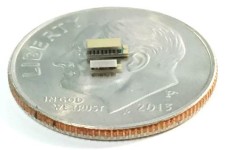A startup based in North Carolina’s Research Triangle Park, Phononic, wants to make refrigeration and temperature control far more efficient, and steadier, than is possible with traditional systems.
Instead of relying on vapor compressors, fans, chillers or passive heat sinks, Phononic makes semiconductors that are smaller than a dime, and actively remove heat from the places or devices where they are installed.
The company has raised $30 million in new equity funding to support the international expansion of its business, and ramp up the use of its tech within refrigeration and electronics.
CEO and founder Tony Atti said Phononics’ technology is both quieter and less energy intensive than other available systems. But customers are embracing it for cost-savings, not to look “green.”
“We can draw a line between a solid state, sustainable solution and something that has real economic value for our customers,” he said.
So far, Phononic chips have been used in wine chillers, medical refrigerators that are used to keep vaccines and biologics at a steady temp, and even in fiber-optic cables, which heat up undesirably as light and data travel through them.
Investors in Phononic’s new round of funding came from a mix of venture and public equity firms: GGV Capital, Lookout Capital, Eastwood Capital Corp, Venrock, Oak Investment Partners, Tsing Capital, Huaneng Invesco WLRoss, the Wellcome Trust and Rex Healthcare Ventures.
With their investments, GGV Capital’s Jenny Lee is joining the board at Phononic along with Bill Holland, Chairman of CI Financial.
Lee compared Phononic’s technology to LEDs, which transformed lighting and adjacent industries.
She wrote in an email to TechCrunch:
“For a disruptive technology to be adopted quickly, we think the approach is to work with the existing ecosystem and players and enable them to be successful versus trying to establish a complete, end-to-end new product, especially if you have a compelling price performance technology, which Phononic does.”
Given the new funding, Phononic plans to add at least 20 new hires to its sales and customer care departments over the next year, Atti said, and to build out its manufacturing and delivery capacity to serve a growing number of healthcare and life sciences customers, first in the U.S. and later in China.
 The company employs 110 full-time today. It has established a factory in North Carolina already and some local operations in China.
The company employs 110 full-time today. It has established a factory in North Carolina already and some local operations in China.
Additionally, Atti said, the business will continue research and development efforts to make its chips even smaller. The CEO’s vision is to “decentralize the cold chain and climate control,” he said.
To translate that for laypersons, Phononic aims to bring its tiny cooling chips to every industry that requires temperature control to safeguard inventory and people.
A 6 oz. or smaller chip, like those made by Phononic, compare to a 22 oz. traditional, vapor compressor refrigeration unit. They can clear up space for inventory within refrigerated trucks, cargo ships and containers, or shelves on a refrigerator in a retail setting like a grocery store or restaurant.
If Phononics’ technology shrinks even further, it could be small and lightweight enough to keep everything from smartphones to drones at a steady, ideal temperature.
